One Day Trip To Grand Canyon Itinerary
Even though it’s massive, but it’s possible to see the highlights in a one day trip to Grand Canyon National Park. I’ve visited Grand Canyon several times, and the best things to see are along the South Rim, and all relatively clustered together, so a one day itinerary is definitely feasible.
In this article:
- The best itinerary for a one day trip to Grand Canyon
- Map of Grand Canyon highlights
- How to get to Grand Canyon + guided tour options
- Where to stay & eat
- Tips for making the most of your 1 day Grand Canyon itinerary
Disclaimer: This article features some affiliate links. I only endorse things I’ve personally used or that come highly recommended by trusted peers. If you purchase anything I mention using my referral links from Amazon, REI or other retailers I may receive a small commission. However, there is never extra cost to you. You can read more here. Thank you for your support.
Day Trip To Grand Canyon: 1 Day Itinerary
My top recommendations for what to do on a day trip to Grand Canyon National Park include:
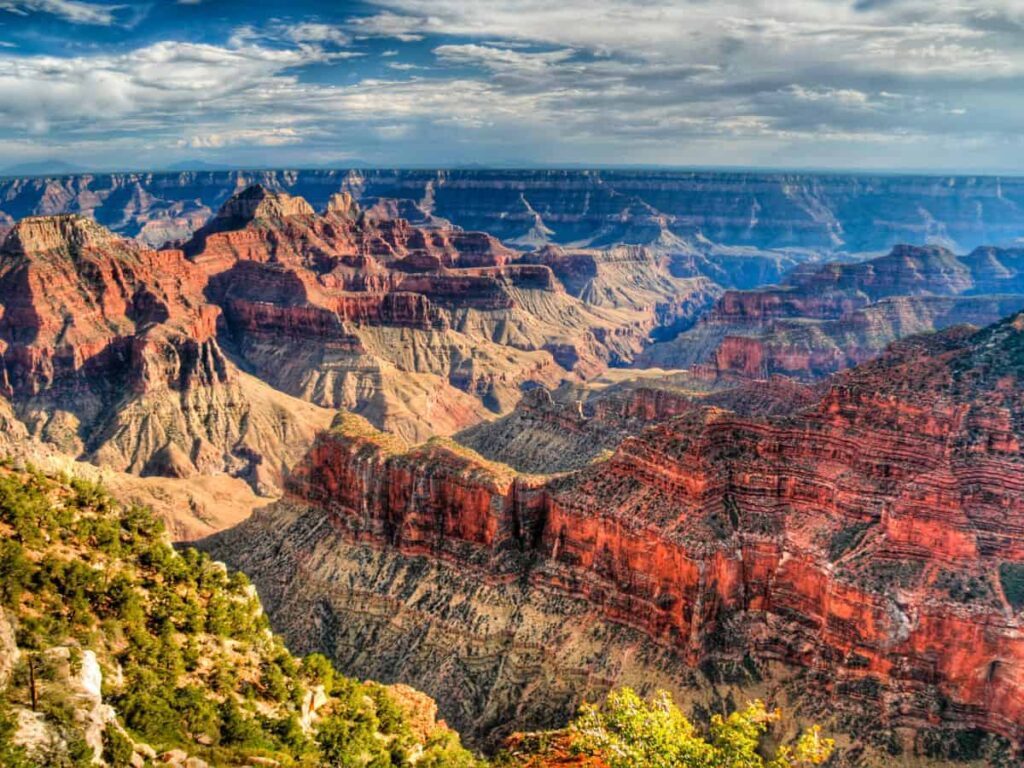
How To Get To Grand Canyon National Park
The easiest ways to get to Grand Canyon National Park are to fly into Las Vegas, Phoenix or Flagstaff.
Distance from Las Vegas to Grand Canyon: 4.5 hours
Distance from Flagstaff to Grand Canyon: 1.5 hours
Distance from Phoenix to Grand Canyon: 3.5 hours
Distance from Page to Grand Canyon: 2.5 hours
Distance from Zion to Grand Canyon: 4.5 hours
Las Vegas is the best airport for Grand Canyon National Park. While Las Vegas is a 4.5 hour drive from Grand Canyon, the flights in and out of LAS tend to be the least expensive and have the most schedule options.
In my experience, rental cars from Las Vegas also tend to be significantly less expensive than other nearby airports.
🚁 Tours From Vegas To Grand Canyon:
From Vegas, you can see the Grand Canyon in half a day with a helicopter tour, a guided day trip or take an epic whitewater rafting trip through the canyon.
Flagstaff is the closest airport, but it is much smaller with fewer, and more expensive, flight options.
🚂 Tours From Flagstaff To Grand Canyon:
From Flagstaff, you can book a guided bus tour, or a trip on the Grand Canyon Railroad.
While Grand Canyon does have it’s own airport (Grand Canyon Airport), flight schedules are limited, expensive, and there are no rental cars from this location.
Grand Canyon South Rim Vs West Rim
Grand Canyon National Park is massive, and is divided into sections:
- South Rim – most popular, easiest to get to, location for most of the parks highlights
- North Rim – very remote, closed in winter
Grand Canyon West (also called West Rim) is technically part of the Grand Canyon (geologically speaking), but is not part of the National Park. This area is on the Hualapai tribe reservation.
Skywalk is located in Grand Canyon West and overlooks the west rim of the Grand Canyon.
It’s a U-shaped bridge with a glass floor that protrudes from the canyon rim 70 feet so you’re hovering 4,000 feet above the canyon floor with unobstructed views.

Skywalk is a few hour detour from Grand Canyon National Park. The entrance fee is $51 per person and if you want to see Skywalk it’s another $28 per person.
In my opinion, this isn’t as scenic as Grand Canyon National Park and is not the best way to spend 1 day in Grand Canyon.
This one day trip to Grand Canyon itinerary focuses on the south rim.
Day Trip To Grand Canyon Map
Use this map to plan your day trip to Grand Canyon National Park! I’ve labeled items by activity type (noted by icon).
How To Use This Map:
Open this map in your browser by clicking the icon in the top right corner. Then click the star icon on the left-side bar. This will save the map to the Google Maps app on your phone so you can easily reference it during your trip.
Locate this map in your Google Maps app by selecting ‘you’ at the bottom of the phone app and then scroll down and click ‘maps’ to find saved trip maps like this one.
One Day Trip To Grand Canyon
To pack as much into a one day trip to Grand Canyon as possible I recommend being strategic about how you move through the park. This means starting at one end of the south rim and moving towards the other, so you won’t waste time shuttling back and forth.
During the summer, Grand Canyon can be very crowded. The best way to avoid the crowds is to arrive early. This will also help with parking and wait time at the entrance gates (which can be up to two hours!!)
Once you’ve parked, I recommend using the shuttle for the rest of the day as it’s a faster way to get around (more on the shuttle system later on.)
With limited time, the best way to see Grand Canyon in one day is to start before sunrise. Sunrise in Grand Canyon is one of the most epic experiences, and photos just don’t do it justice. You have to see it for yourself!
Many people watch sunrise from one of the viewpoints along the rim, but I think it’s best seen from below the rim.
Sunrise: Hike Into The Canyon (Bright Angel Or South Kaibab)
You don’t have to hike the entire way to the bottom of Grand Canyon (about 5,000 feet down) in order to enjoy these trails.
In fact, I recommend only hiking down 1-2 miles. This is where you’ll get the best views, but you’ll still have enough time to see the other highlights in the park in just one day.

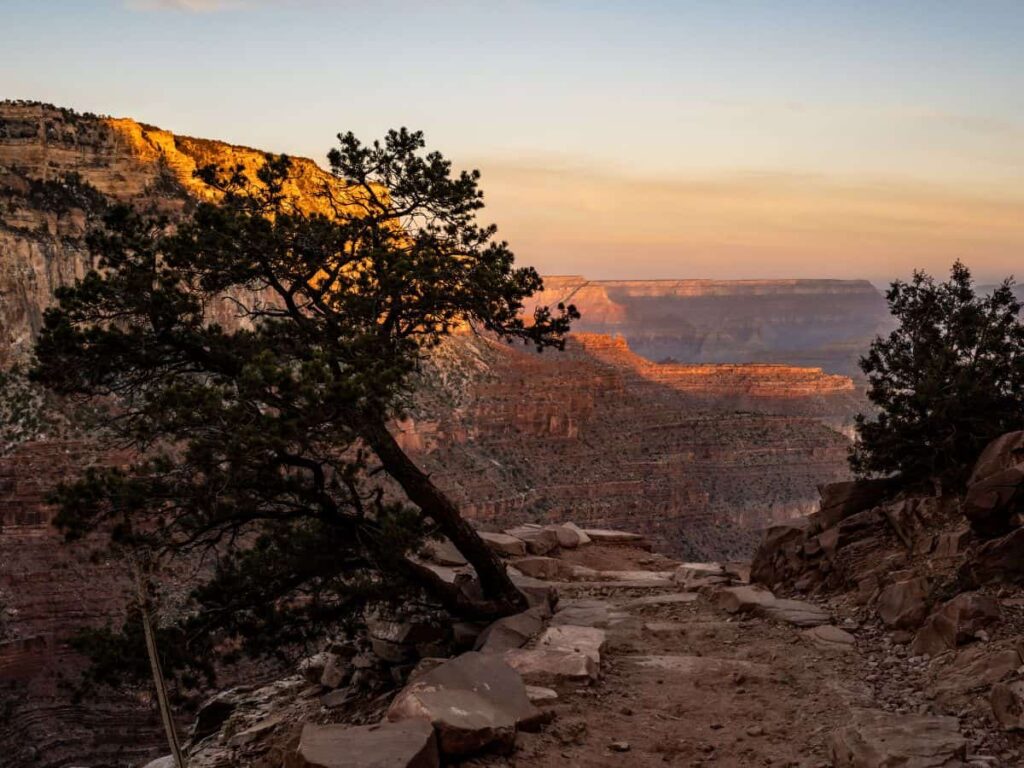
There are two good options for hikes below the rim:
- Bright Angel (15.8 miles)
- South Kaibab (14.3 miles)
Bright Angel seems to be the most popular, but I actually think South Kaibab is the better trail for views, and is less crowded.
This is the perfect way to see sunrise in Grand Canyon National Park and avoid the crowds. Mathers Point is also a great sunrise spot, but it’s insanely busy and not that peaceful.
Once you get about half a mile down South Kaibab the views open up and you’re able to see the entire canyon all around you.
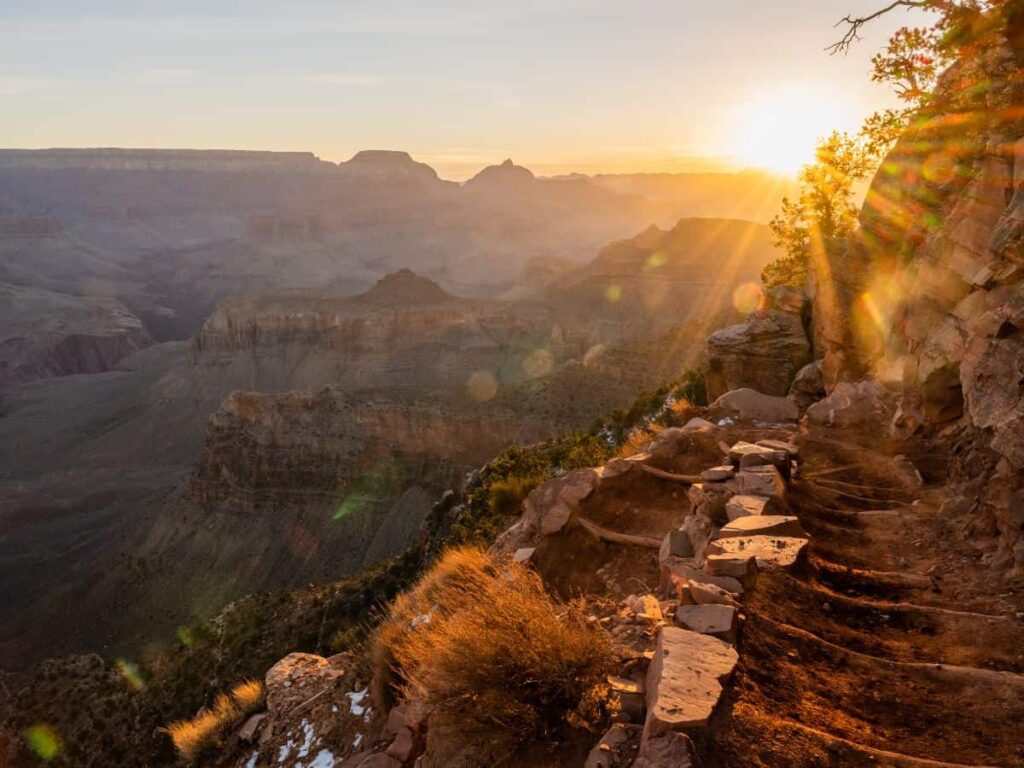

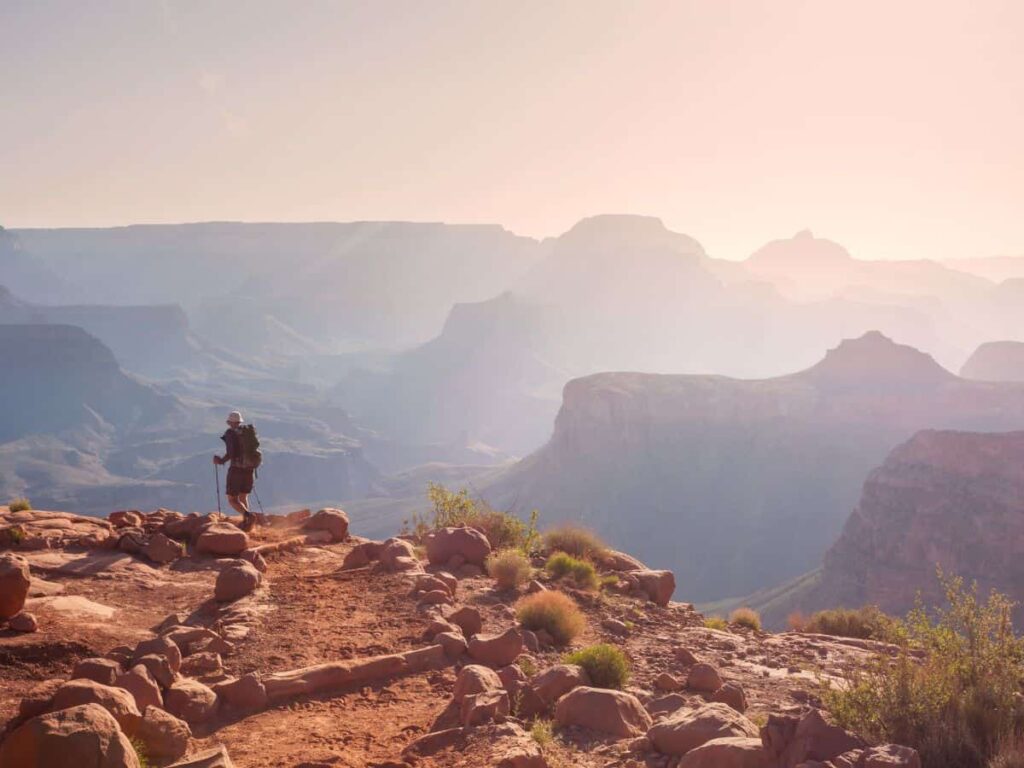
A mile down the trail you’ll reach Ooh Ahh Point. Definitely hike this far down because the view from this point is unparalleled!
Note: There is no water on South Kaibab trail, and very little shade. This is best done in the morning before the heat sets in.
Keep in mind that due to the elevation change, it takes about half as long to hike up the trail as it does to hike down.
In total, the hike to Ooh Ahh Point and back takes around 1.5 hours, with stops.
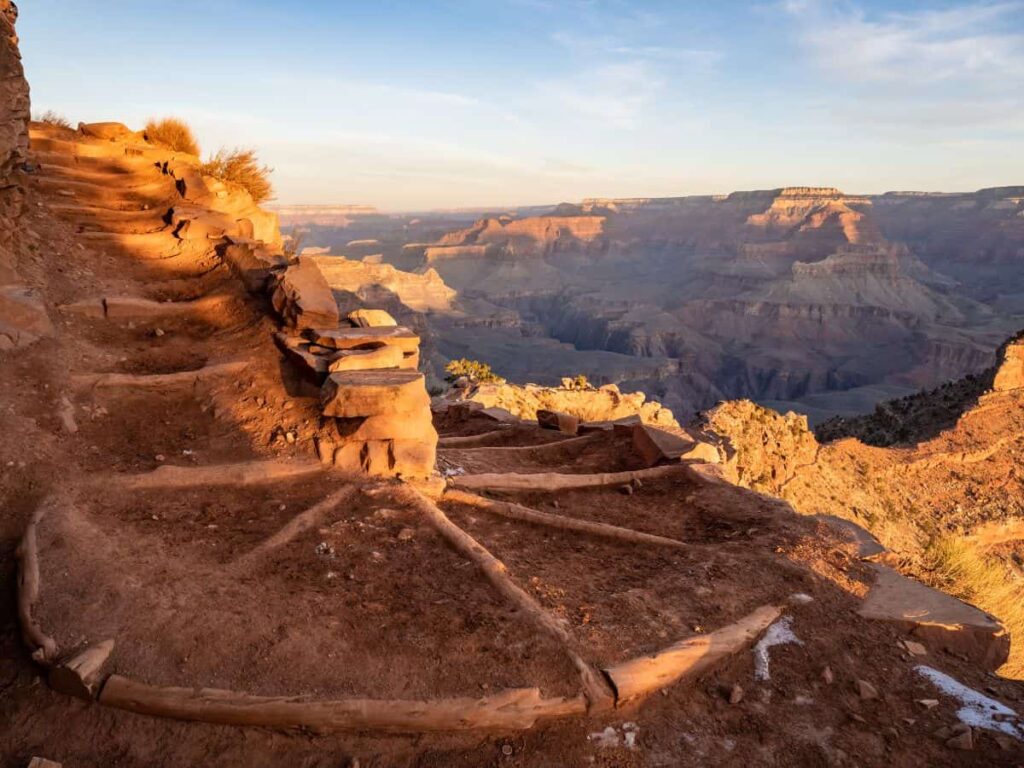
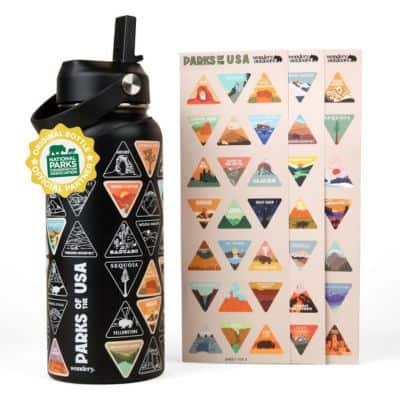
National Parks Water Bottle
A fun way to collect all 63 National Parks!
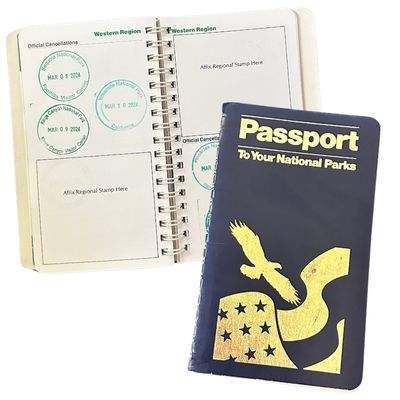
National Parks Passport
Keep track of the parks you’ve visited (with dates!)
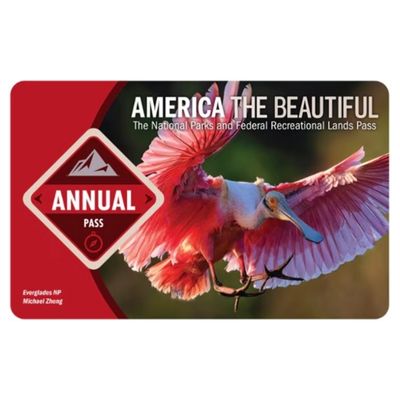
America The Beautiful Park Pass
Frequent visitors save money on entrance fees
Morning: Walk Part Of Rim Trail
Rim Trail follows the south rim of the Grand Canyon and is an easy, mostly paved trail that starts from South Kaibab trailhead.
In total, Rim Trail is 12.8 miles, but you can complete smaller sections. The Grand Canyon shuttle has several stops along the trail, so it’s easy to hop on and off as you’d like.
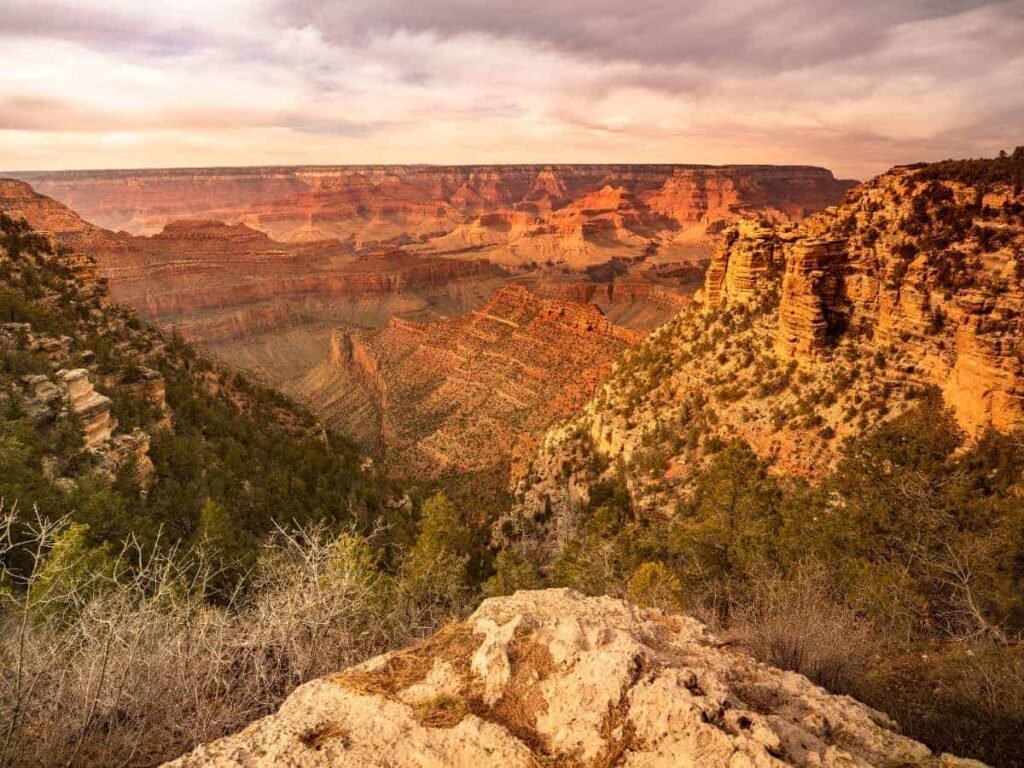
After hiking part of South Kaibab trail, walk along the first portion of Rim Trail towards Mathers Point (right next to the Visitors Center) which is only 2.5 miles.
If you’d prefer to take the shuttle, you can catch the yellow line at South Kaibab Trailhead and take it back to the Visitors Center.
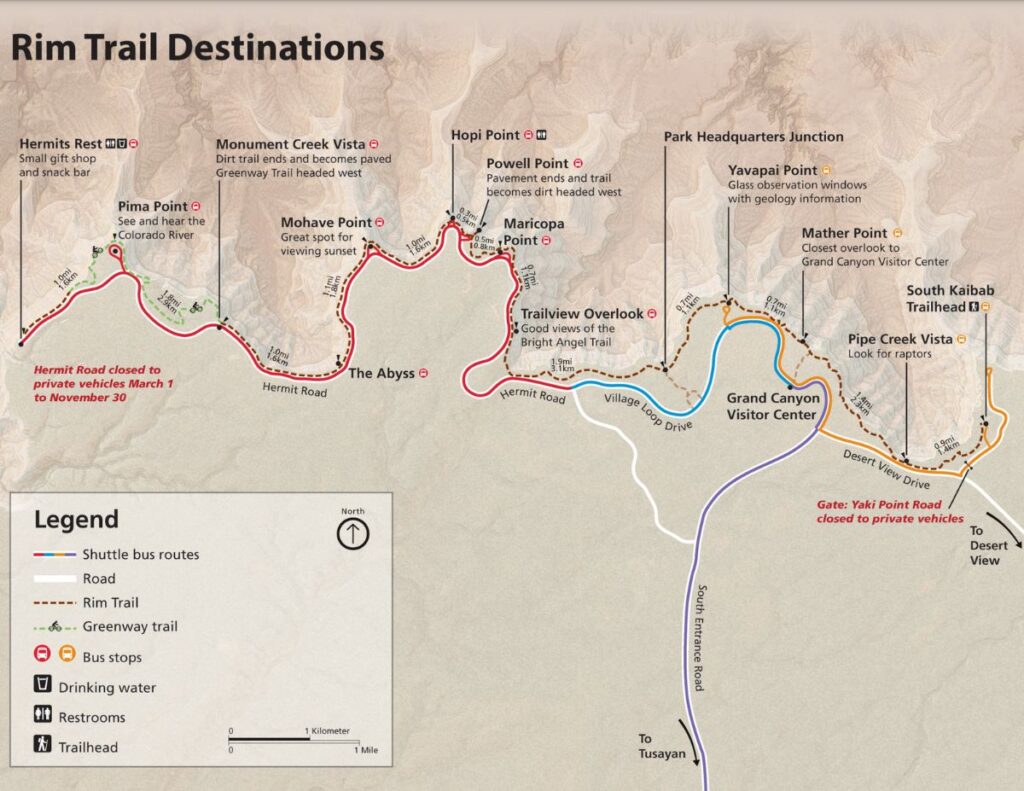
From the Visitors Center you can get on the blue shuttle line so you won’t have to transfer. If you catch the shuttle before the Visitors Center you’ll just have to switch lines to keep moving west.
Late Morning: Hermit Road
After hiking into the canyon, and along Rim Trail, spend the rest of the morning exploring Hermit Road.
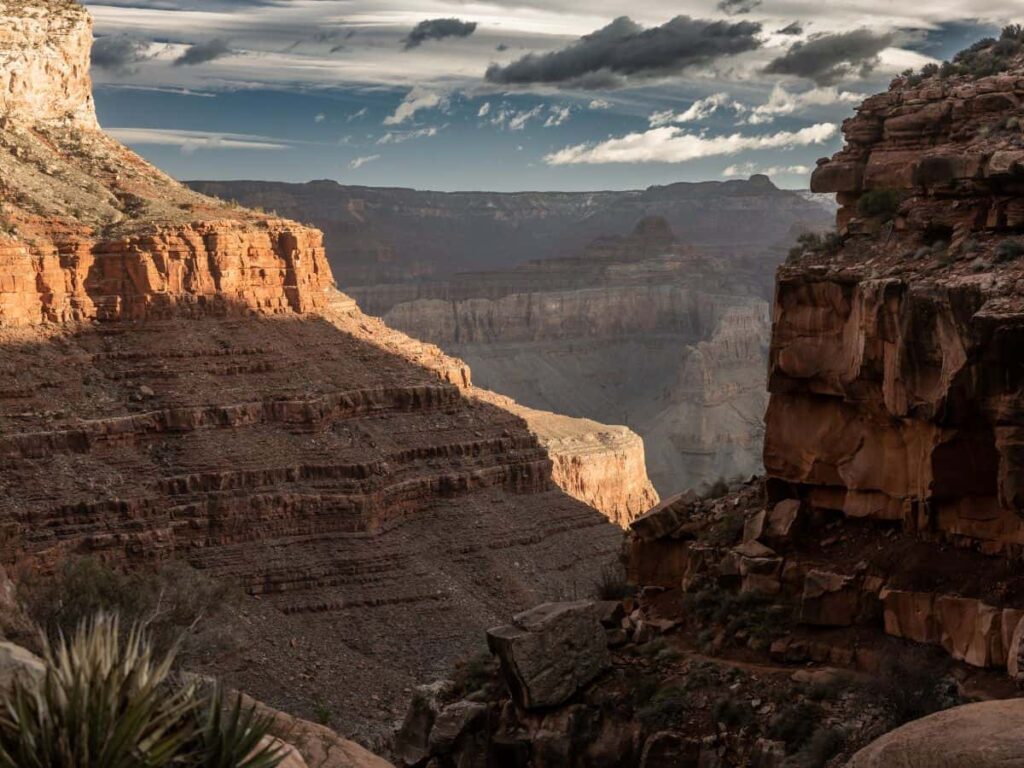
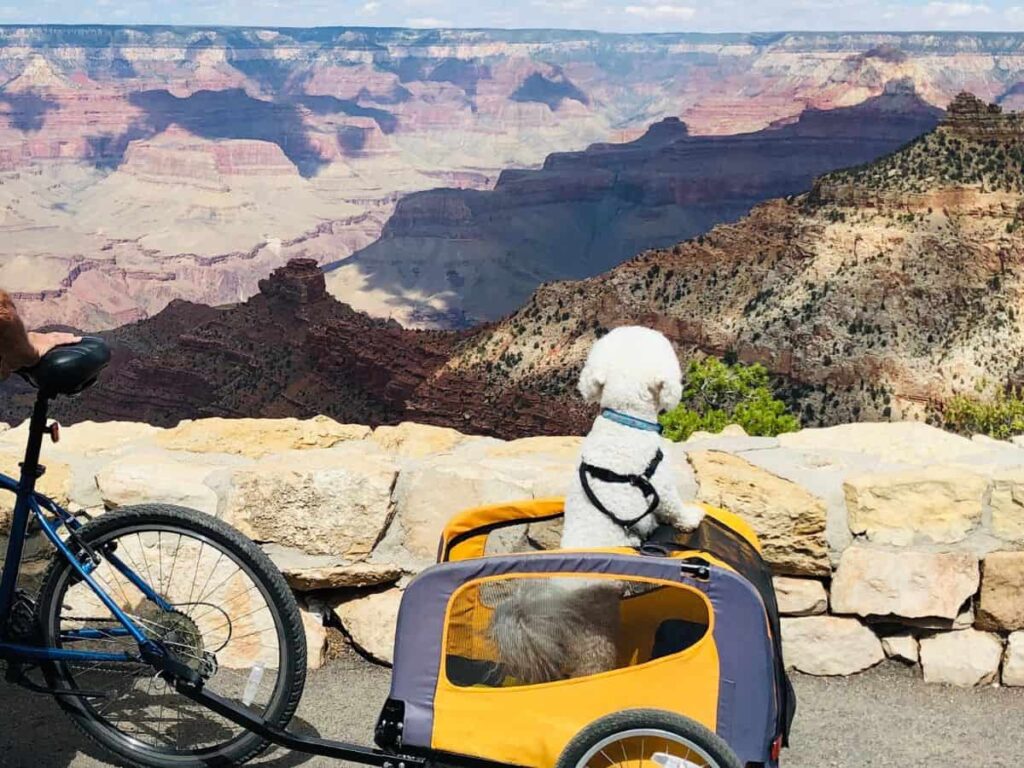
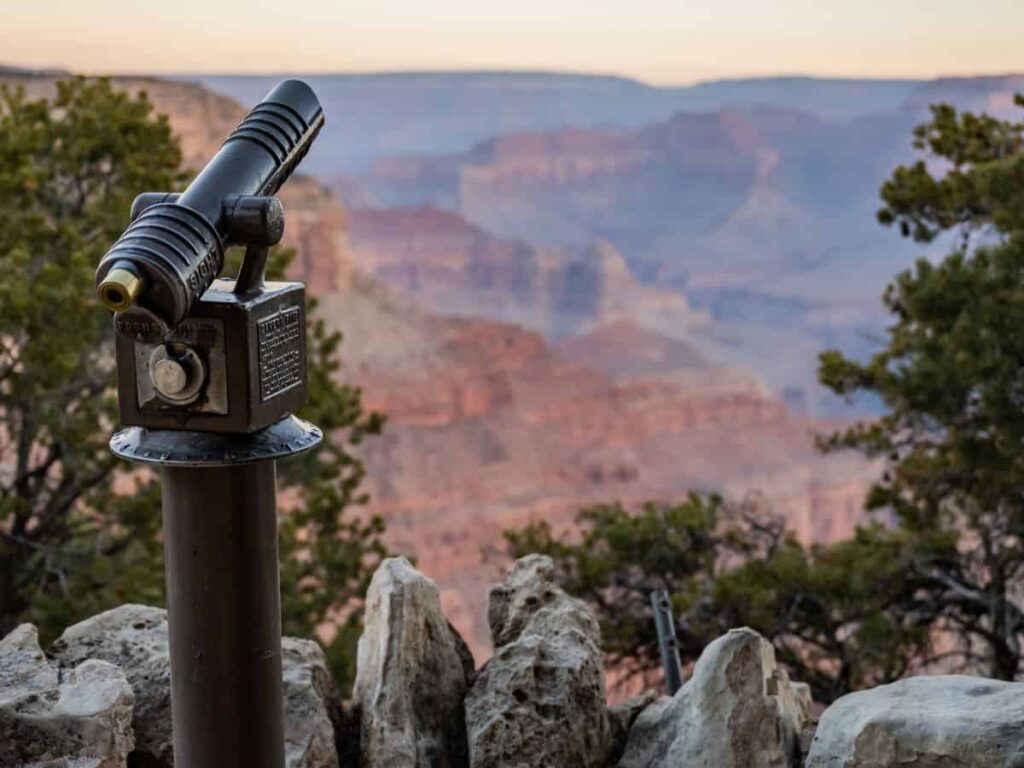
I recommend renting a bike to explore Hermit Road (7.8 miles). Bike rentals can be picked up from Bright Angel Bikes near the Visitors Center. They have traditional and e-bikes available. It’s best to book in advance, especially during the summer.
If you’d prefer to drive Hermit Road you can take the shuttle (March – November) or drive your own vehicle (December – February only).
On your way from the visitors center to Hermit Road I recommend stopping by Yavapai Cafe for coffee and breakfast!
There are several viewpoints along Hermit Road to check out:
- Trail View Overlook
- Maricopa Point
- Powell Point
- Hopi Point (best view of Grand Canyon sunset)
- Mohave Point
- The Abyss
- Monument Creek Vista
- Pima Point
- Hermit Trailhead
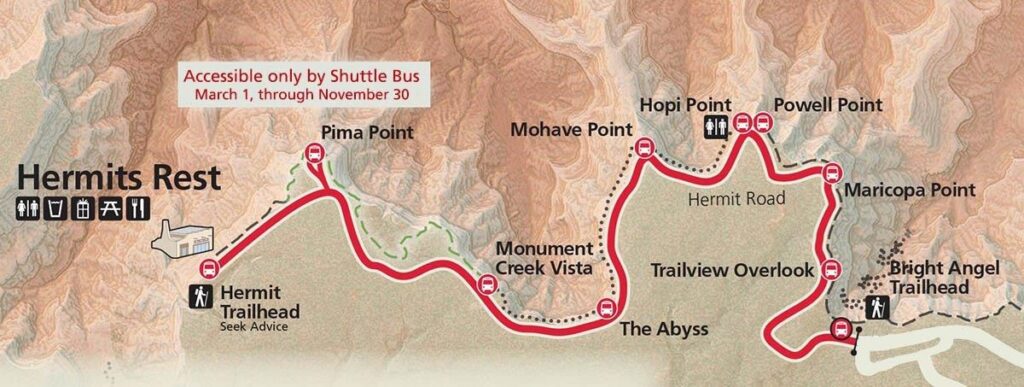
Lunch
By now you’ve worked up an appetite, and the heat of the day is starting to set in, so I recommend grabbing lunch in Grand Canyon Village before spending some time exploring from your air conditioned car!
Yavapai Tavern and Harvey House Cafe offer table service and pub-style food. Or, for something quick, stop by Maswik Food Court.
Late Afternoon: Desert View Scenic Drive
Spend the afternoon driving along Desert View Scenic Drive. This route isn’t served by the shuttle system, so you’ll need your own rental car to explore.
There are several great viewpoints along the road, which is 23 miles long. It’s less crowded than the main section of the south rim because the shuttle doesn’t come here, but parking lots can still be quite full.
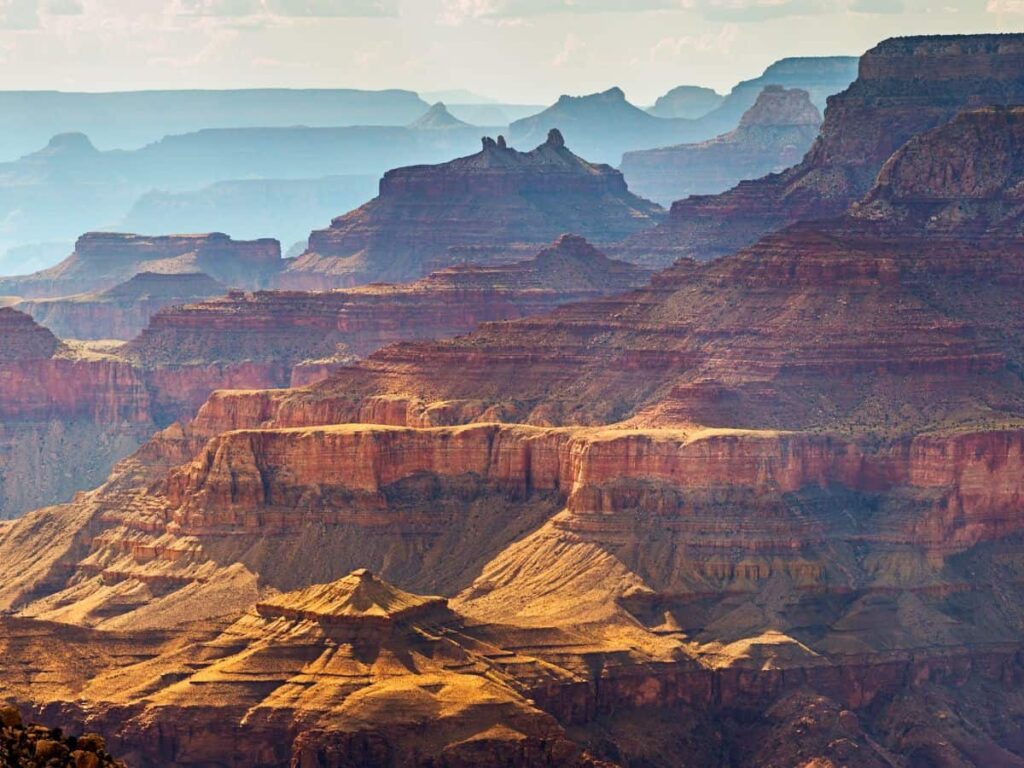
Luckily, most people only spend a few minutes at each stop to get out and see the view, so parking spaces open up quickly.
These are the viewpoints on Desert View Drive from west (towards the Grand Canyon Village) to east (towards Desert View Watchower):
- Grandview Point
- Buggeln (picnic area)
- Moran Point
- Tusayan Museum & Ruin
- Lipan Point
- Navajo Point
- Desert View Watchtower
In the evening, there are many great restaurants in Grand Canyon Village, or you can venture out of the National Park for some additional options.

I recommend heading back to Hopi Point (on Hermit Road) for sunset, so be sure to give yourself enough time to re-enter the park, park your car, and catch the red-line shuttle to the viewpoint.
Hopi Point protrudes the farthest into the canyon, so the views from here are the best at sunset because you can see much more of the canyon in all directions.
Where To Stay Near Grand Canyon
The best place to stay when visiting Grand Canyon is inside the National Park. You’ll have easy access to the shuttles, and you won’t have to sit in long lines to enter the park in the morning.
However, there are several good options just outside the National Park that are more budget friendly.
Hotels In Grand Canyon
- El Tovar Hotel – luxury
- Bright Angel Lodge – mid-range
- Kachina Lodge & Thunderbird Lodge – convenient location
- Maswik Lodge – budget
- Yavapai Lodge – budget
Hotels Near Grand Canyon
- Squire – resort
- Grand Canyon Plaza Hotel – luxury
- The Grand Hotel – mid-range rustic lodge
- Holiday Inn Express – mid-range
- Red Feather Lodge – upper mid-range
- Tiny Home Rentals – private cabins
- Stargazing Tiny Home – unique vacation rental stay
There are also budget-friendly options for camping in Grand Canyon (starting at $12/night)
- Desert View Campground ($12/night, first-come first-serve)
- Mather Campground ($18/night, reservations recommended)
- Trailer Village (prices vary, reservations recommended)
Where To Eat At Grand Canyon
Grand Canyon offers a large variety of restaurants on the south rim, with fine dining options as well as take-away places.
During the day, I recommend eating inside the park because re-entry can take a while when the lines are backed up.
- Arizona Steakhouse – traditional steakhouse
- Harvey House Cafe – American cuisine
- The Fountain – grab and go meals
- El Tovar – fine dining
- Yavapai Tavern – casual tavern pub fare
Tips For A One Day Trip To Grand Canyon National Park
After visiting a few times, I can say the best tips for your day trip to Grand Canyon National Park are how to avoid crowds and strategically navigate the park to avoid peak times at popular spots.
Arrive Early, Avoid Crowds And Long Entrance Lines
The entrance lines to Grand Canyon (especially the south entrance on RT-64) can get backed up – sometimes by hours.
The best way to avoid long entrance lines is to arrive early. Typically, gates are staffed starting at 8am. If you arrive prior to 8am there’s almost no wait as no one is collecting payment (it’s on the honor system outside of business hours.)
I would avoid entering the park between 10 am – 2 pm, as these are when you’ll encounter the longest lines.
While there are massive parking lots along the south rim, they also can become completely full by 10 am, so arriving early will help you easily find a parking space.



Time Zone Changes
Arizona has a tricky time zone. While they are located in Mountain Time, they don’t follow daylight savings time.
This means Arizona is an hour ahead of Nevada in the winter, but during summer (daylight savings) they’re the same time as states in PDT, like Nevada and California.
If you’re coming from Utah to Grand Canyon, Arizona is the same time during the winter, but during summer (daylight savings) Arizona is an hour behind Utah.
Grand Canyon Shuttle
Grand Canyon offers a free shuttle along the south rim. There are 4 shuttle routes that will take you to different parts of the rim, Grand Canyon Village and the gateway town of Tusayan.
- Blue – Lodges, campgrounds and Grand Canyon Village Historic District
- Orange – South Kaibab Trailhead, Yaki Point, Pipe Creek Vista, Mather Point and Yavapai Geology Museum
- Red – Stops along Hermit Road, operates March 1 – Nov 30 only
- Purple – free shuttle service between Tusayan (town outside of Grand Canyon) and the park, operates in summer only from 8am to 9pm with shuttles every 45-minutes

Grand Canyon Entrance Fee & Reservations
The entrance fee for Grand Canyon is $35 per vehicle, and is good for 7 days.
Or, if you have the America The Beautiful Annual Parks Pass your admission is free.
The annual pass is $80 and good for a rolling 12-months. Only one pass is needed per vehicle, but the card holder must be present and show ID.
Even better, the annual pass gets you access to the express line at the entrance gates. During the summer, Grand Canyon entry lines can be up to 2 hours long, so this can save you a ton of time getting into the park.
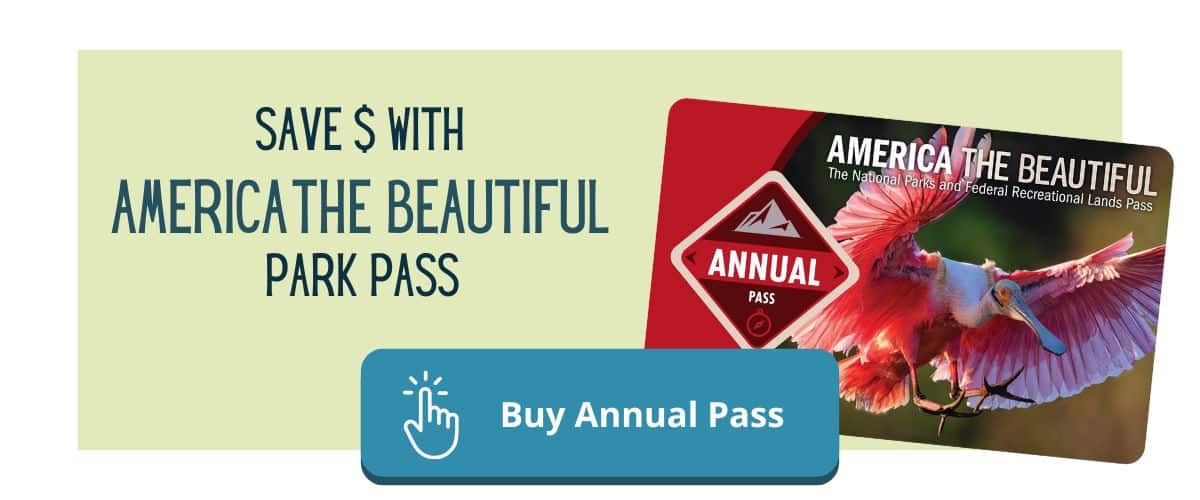
Even though Grand Canyon welcomes more than 6 million visitors per year, the park infrastructure is well developed and capable of managing the crowds so there are no timed-entry or vehicle reservation requirements.
Best Time To Visit Grand Canyon South Rim
The best time for a day trip to Grand Canyon south rim is spring or fall, when the weather is mild and the crowds aren’t as insane.
On my last trip to Grand Canyon, I visited in mid-April. The rim was still cold at night, with spots of snow, but inside the canyon temperatures were reaching the upper 80’s during the day. It was perfect weather for hiking.
During the summer, lightening and flash floods are a threat. If you see lightening you should immediately leave the rim and seek shelter.
Keep an eye on the weather, rain (even storms many, many miles away) can lead to flash flooding in the canyon.
Average temperatures in spring & fall: the rim ranges from 32°F to 63°F, and inside the canyon ranges from 56°F to 82°F.
Average temperatures in summer: the rim ranges from 48°F to 83°F, and inside the canyon range from 72°F to 104°F.
Average temperatures in winter: the rim ranges from 19°F to 45°F, and inside the canyon ranges from 36°F to 56°F.

Seasonal Closures At Grand Canyon National Park
During the summer season, just about everything in Grand Canyon National Park is open.
However, during the off-season some shuttle routes and trails are closed:
- Purple shuttle route to Tusayan only operates in summer
- Red shuttle route to Hermit Road only operates in summer
- Grand Canyon North Rim – only open in summer
- Desert View & North Rim campgrounds – only open in summer
Note: Bright Angel Trail is closed between Havasupai Gardens and Bright Angel Campground from October 21, 2024 through May 14, 2025 for ongoing Trans Canyon Waterline work. This is a multi-year project that causes seasonal closures to this section of Bright Angel each winter and is expected to last through 2026.
Limited Cell Service In National Parks
Grand Canyon has very limited cell phone coverage. While you’re in the park it’s unlikely you’ll have a signal.
Before you visit, I recommend downloading an Offline Map of the area in your Google Maps app.
While you won’t have cell signal, you will still have GPS (connects to satellites, not cell towers) so your Google Maps app will work as long as the map is stored on your phone and doesn’t require cell connection to load.
I also recommend downloading the hiking trails you plan to take in the AllTrails app. This is a fantastic app for route information, navigation, and several safety features, like the ability to share your real-time location with friends and family.
I like to save my planned hikes to a folder for each National Park that I visit, so they’re easy to find when I arrive.
❤️ A Love Note About AllTrails ❤️
My Favorite App For HikingSome links on this post show you the detailed AllTrails guide for each recommended hike. I love AllTrails+ for my National Park trips. It allows me to easily pre-plan my hikes, save trails to personalized lists for easy access, and download them so I can access route information while out of cell service.
As a solo hiker, the live sharing capabilities make me feel much safer knowing someone else has my coordinates, and if I wander off the trail the app alerts me so I don’t get lost.
Pin This Post And Come Back To It Later!






This is an incredible itinerary! I love the information and it turns a daunting trip into a feasible adventure! You may have mentioned this and I just missed it, but we travel with our dog. She is a well behaved 25lb dog but not a service dog. Would she be allowed on these adventures? If so which ones would she or not? Thank you!!
So glad you found it helpful! Grand Canyon is fairly dog friendly, but depending on when you’re visiting it can be VERY hot so just be mindful of the pavement temperatures.
There’s a dog kennel in Grand Canyon and I would strongly recommend getting reservations as far in advance as you can.
Hikes – all of the trails along/above the South rim are pet-friendly. That includes Rim Trail and Hermit Road. Nothing below the rim though, and they can’t ride the shuttles.
Campgrounds – the campgrounds are pet-friendly. I stayed at Mather Campground and it’s really well shaded with lots of paths to walk your dog.
Lodging – the only pet-friendly hotel in Grand Canyon is Yavapai Lodge
You should also check with a ranger to participate in the BARK ranger program! Your dog gets a little badge 🙂
If you don’t already have a pet temperature monitor check out Necto! I use it while I travel with my dog for times when I have to run an errand (like groceries) and he has to stay in my camper – it sends me alerts if the temperature gets too hot or my AC shuts off unexpectedly.